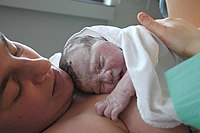
Photo from wikipedia
Background In resource-limited settings, childbirth remains a matter of life and death. High levels of childbirth fear in primigravid women are inevitable. To date, few studies have explored interventions to… Click to show full abstract
Background In resource-limited settings, childbirth remains a matter of life and death. High levels of childbirth fear in primigravid women are inevitable. To date, few studies have explored interventions to reduce childbirth fear in primigravid women. This study aimed to evaluate the efficacy of companion-integrated childbirth preparation (C-ICP) during late pregnancy for reducing childbirth fear and improving childbirth self-efficacy, birth companion support, and other selected pregnancy outcomes in primigravid women. Methods A quasi-experimental study was carried out using a non-equivalent control group design to recruit a sample of 70 primigravid women in hospital maternity waiting homes in the intervention and control groups, with 35 in each group. The primigravid women and their birth companions in the intervention group received two sessions of companion-integrated childbirth preparation, whereas the control group received routine care. A questionnaire that incorporated the childbirth attitude questionnaire (CAQ), the childbirth self-efficacy inventory (CBSEI), the birth companion support questionnaire (BCSQ), and a review checklist of selected pregnancy outcomes was used to collect data. Pretest and post-test data were analyzed using simple linear regression. Beta coefficients were adjusted at a 95% confidence interval with statistical significance set at a P -value of < 0.05 using Statistical Package for the Social Sciences version 25. Results At pretest, mean scores were similar in the intervention and control groups. At post-test, being in the intervention group significantly decreased childbirth fears ( β: = − .866, t (68) = − 14.27, p < .001) and significantly increased childbirth self-efficacy ( β: = .903, t (68) = 17.30, p < .001). In addition, being in the intervention group significantly increased birth companion support ( β : = − 0.781, t (68) = 10.32, p < .001) . However, no statistically significant differences regarding pregnancy outcomes were observed between the study groups (Mann–Whiney U test, p > .05). Conclusion The findings of our study suggest that C-ICP is a promising intervention to reduce childbirth fear while increasing childbirth self-efficacy and maternal support. We recommend the inclusion of C-ICP for primigravid women during late pregnancy in resource-limited settings.
Journal Title: BMC Pregnancy and Childbirth
Year Published: 2020
Link to full text (if available)
Share on Social Media: Sign Up to like & get
recommendations!